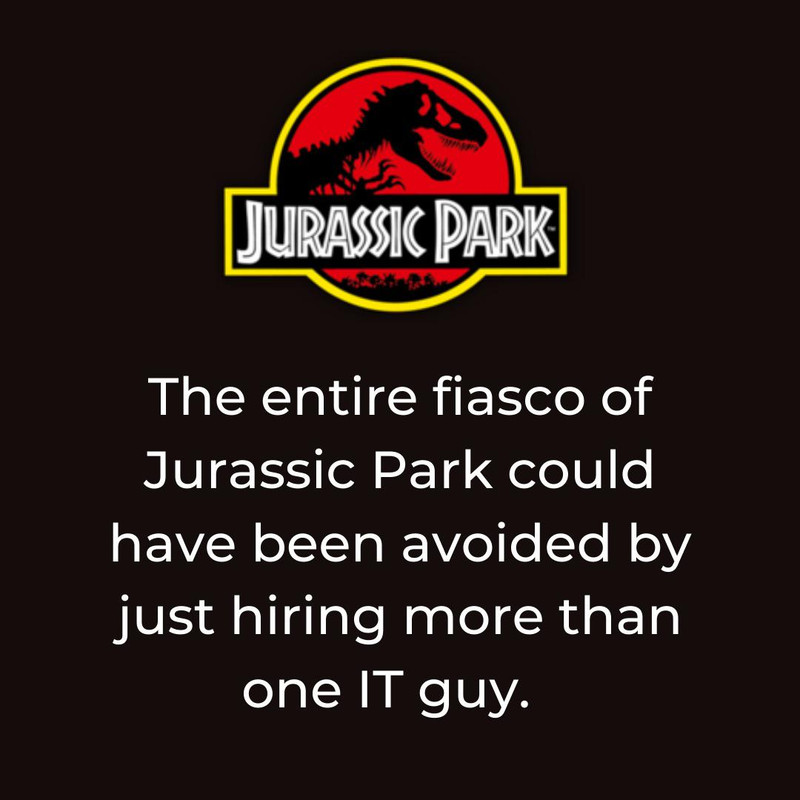My rating: 4 of 5 stars
The late Michael Crichton’s Jurassic Park, which would spawn a highly-successful Amblin Entertainment media franchise, has an interesting style, with occasional intermediaries between a few chapters, not numbered in his magnum opus, depicting the evolution of a fractal curve in sync with the crisis that occurs at the book’s eponymous dinosaur-populated resort. After the beginning visualized fractal curve, Crichton begins with admonition about the commercialization of genetic engineering and how scientists tend to ignore national boundaries, believing themselves to be above the concerns of politics and even international conflict, with the private corporation InGen’s genetic crisis going unreported.
The official prologue of the book tells of a teenager who allegedly received an injury during a construction accident at the forthcoming Jurassic Park, when really it was the result of one of the more-intelligent dinosaurs resurrected from their period of existence, the vicious velociraptor. Another incident involving them occurs at the Cabo Blanco Biological Reserve, on the western coast of Costa Rica, where a young girl named Tina is victim to an attack by a diminutive dinosaur, after which comes a mysterious illness. Doctors deem the perpetuator of the attack to be the result of a normally-harmless basilisk lizard, except that the number of toes was inconsistent, the creature also having avian features.
John Hammond, the aged proponent of Jurassic Park, finds himself under suspicion by lawyers, although his he confident in his forthcoming resort, believing visits by attorneys to be purely social, and had used a diminutive elephant in past fundraising efforts for his scientific ambitions. In the meanwhile, the Biosyn Corporation of Cupertino, California, calls a meeting of its board of directions, discussing InGen and the successful cloning of long-deceased dinosaurs. Another skeptic of Hammond’s dinosaur park is Ian Malcolm, skilled in chaos theory, who believes the resort to be an accident waiting to happen.
Archaeologist Alan Grant and his companion Ellie Sattler receive invitations to visit Jurassic Park, the two impressed by the successful recreation of dinosaurs, with Dr. Henry Wu being the mastermind of resurrection thanks to extracting dino DNA from prehistoric amber, filling in their gaps with frog genes, which somewhat proves critical to what ultimately happens in the resort. A high mortality rate in San José, Costa Rica, causes concern, given the possibility that dinosaurs and their respective influenza escaped the island. Wu himself desires “upgrades” to the park’s dinosaurs, rightfully wanting weaker incarnations, although Hammond disagrees.
John Arnold, in charge of the park’s control mechanisms, believes the resort’s computer systems to be secure, with the suggestion that Jurassic Park would ultimately come to feature “rides”. Crichton gives occasional factoids such as the greatest scientific advancements beyond the Second World War coming from private laboratories, as well as the inception of computers in the late 1940s due to mathematicians’ desires to predict the weather. Malcolm yearns to keep track of the exact number of dinosaurs on the island, with the revelation that despite Wu allegedly making all the animals female, they are somehow reproducing.
Disaster comes to encompass Jurassic Park thanks to the antics of the resort’s information technology specialist Dennis Nedry, who wants to make money off of frozen dinosaur embryos, with the electrified fences failing and a tyrannosaur escaping onto the main tour road, with John Hammond’s grandchildren Tim and Lex, along with Grant, Sattler, and the visiting lawyers, struggling for their lives, and Arnold doing his best to restore power and get the park back in order. The velociraptors prove just as big a threat as the t-rex, and given the crisis, consideration is given to bombing the island resort, with the novel’s ending hinting that the incident was only the beginning.
All in all, Jurassic Park is undoubtedly Crichton’s masterpiece, providing great sociopolitical commentary about the arrogance, danger, and fallibility of unchecked science and its consequences, with the agreeable implication that dinosaurs are better off extinct. Most of the introductory material is absent from Steven Spielberg’s iconic film adaptation, although many of the action sequences, with occasional diversions from the novel, are present. Some of the lamer elements of the film such as Arnold’s “Hold on to your butts” and Nedry’s “Uh-uh-uh!” are mercifully absent from the book, and aside from possible lack of visibility for the appearances of characters and the dinosaurs, I would very much consider it one of the greatest novels of the twentieth century involving the long-extinct animals.
View all my reviews
I also very much agree...


No comments:
Post a Comment